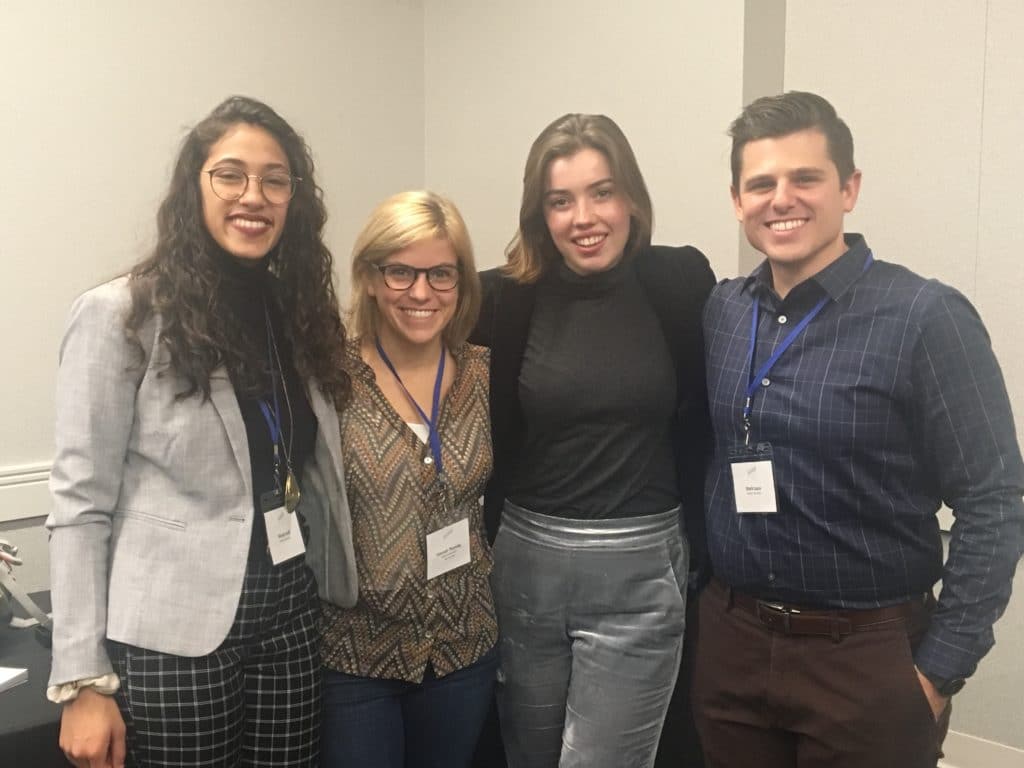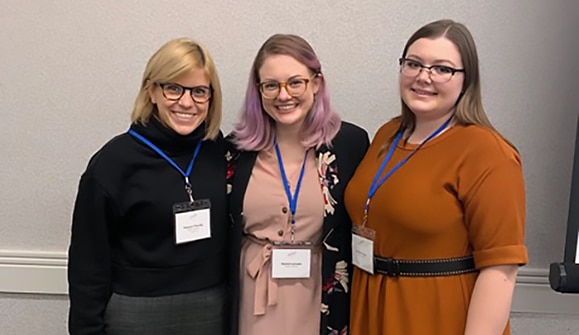Sixteen members of the DePaul community recently represented the university at the International Writing Centers Association/National Conference on Peer Tutoring in Writing (IWCA/NCPTW) Joint Conference held from October 16–19 in Columbus, Ohio. All of the DePaul attendees have worked at The University Center for Writing-based Learning (UCWbL), including a few of our very own WRD students.
Three MA in WRD students presented at the conference: Rachel Larrowe, Hannah Thornby, and Maddy Crozier, as well as three WRD undergraduate students: Patricia Haney, Isabel Cueto, and Paige Gilberg. Fellow DePaul student presenters included Nicole Huff, Bridget Harris, Lexi Skordilis, and Sahi Padmanabhan. UCWbL administrators and staff included Erin Herrmann, Jen Finstrom, Edward Evins, Katie Brown, Katie Martin, and Matthew Pearson.
Great work, everyone! Keep reading for an overview of each conference presentation.
MA in WRD Student Presentations
Hannah Thornby (MA in WRD) presented alongside Nicole Huff (MA in English), Isabel Cueto (BA in WRD + Spanish) and Mark Lazio (WRD Adjunct Faculty) in their panel presentation titled “Redeveloping Tutor Training: Supporting Tutors’ Work with English as an Additional Language Writers.” Their presentation shared how The Writing Center redeveloped its approach to tutor training and professional development to better support the center’s work with EAL writers.

Hannah Thornby, Rachel Larrowe (MA in WRD), and Lauren Rouse (MA in English ‘19, Current PhD Student at University of Central Florida) led a workshop titled “Strategies for Supporting Visual and Kinesthetic Learning Styles in All Parts of the Writing Process.” The workshop introduced attendees to activities that they can use to support writers with visual and sensory learning styles.
Maddy Crozier (MA in WRD) displayed a poster titled “Innovating through Institutional Ethnography: Uncovering What, Where, and How Writing Means in Our Writing Center.” Through the poster, she shared findings from a research project that described the conceptions of writing held by writing center administrators and peer writing tutors.
WRD Student Presentations
Paige Gilberg (Combined BA/MA in English Literature, Minor in Professional Writing) displayed a poster titled “Making Transitions: Gender Identity and the Writing Center.” Paige shared research about how writing centers across the country engage with gender identity, exploring topics such as identity-consciousness training for tutors and administrators, strategies for promoting inclusivity in the physical and virtual writing center space, and the role of the writing center in shifting ideas about gendered language in writing.
Patricia Haney (WRD + English Literature) and Isabel Cueto (WRD + Spanish) presented with Sahi Padmanabhan (Journalism + Women’s and Gender Studies) and Lexi Skordilis (English/Creative Writing + Communications and Media). Their presentation, titled “Combating Elitism: How Tutors Can Make Collegiate Writing More Inclusive,” shared results from a survey in the first-year writing program and suggested tangible methods and tutoring strategies to help make writing centers more inclusive.
DePaul Community Presentations
UCWbL administrators and staff members Erin Herrmann, Katie Brown, Katie Martin, Edward Evins, Mark Lazio, and Jen Finstrom presented “Action Research Assessment in the Writing Center.” The team showcased the UCWbL’s assessment initiative, with each presenter sharing how and why the assessment initiative developed as well as how each of the five programs conducted assessment projects and applied their findings.
Bridget Harris (Acting) led a workshop titled “Conservatory to Conversation: Using Voice Training To Prepare Tutors for Conversation Partner Appointments with English as an Additional Language (EAL) Writers.” She drew from the artistic training she receives at her acting conservatory to explore how an understanding of vocals can be used as a tutoring tool when teaching phonetics to EAL writers.
Katharine Romero-Jimenez (MA in WRD ‘19) presented a poster titled “Toward a More Collaborative Conversation: Linguistic Practices of Writing Center Tutors.” She paired primary discourse research from the UIC Writing Center with secondary research in sociolinguistics and writing center studies to support the idea that writing centers should implement training models around collaborative linguistic practices so that tutors can cultivate self-awareness and work toward more collaborative conversations with writers.
*All presentation descriptions draw from abstracts provided by the authors in the conference program.
